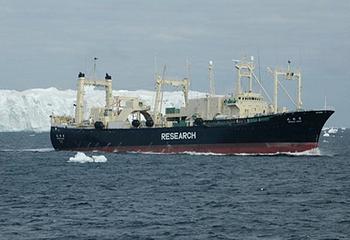
CANBERRA, Australia, May 1, 2013 (ENS) – Australian Attorney-General Mark Dreyfus will argue Australia’s whaling case against Japan in a three week hearing before the International Court of Justice in the Hague beginning on June 26.
“I welcome the announcement of the International Court of Justice hearing date,” said Dreyfus. “Australia wants this slaughter to end. We will now have our day in court to establish, once and for all, that Japan’s whaling hunt is not for scientific purposes and is against international law.”

On May 31, 2010, Australia commenced proceedings against Japan in the International Court of Justice, challenging the legality of Japan’s program of “scientific” whaling in the Southern Ocean. The Attorney-General’s Department has primary responsibility for conducting this litigation.
The International Court of Justice has received written submissions from both parties.
“The fixing of the date sets up the final stage in this case brought by the Australian Government,” Dreyfus said. “The oral hearings are the last phase of legal proceedings before the Court makes its decision.”
Australia says the Japanese whaling fleet conducts “scientific research” in international waters that include an Australian maritime rescue zone that Canberra regards as a whale sanctuary.
Japan does not recognize that claim, and says its right to conduct “lethal research” in the area is protected by the International Whaling Commission, despite a global moratorium on commercial whaling that took effect in 1986.
Nevertheless, more than 30,000 whales have been killed since the moratorium came into effect.
The IWC regulations state, “…any Contracting Government may grant to any of its nationals a special permit authorizing that national to kill, take and treat whales for purposes of scientific research subject to such restrictions as to number and subject to such other conditions as the Contracting Government thinks fit, and the killing, taking, and treating of whales in accordance with the provisions of this Article shall be exempt from the operation of this Convention.”
Japan began its Antarctic special permit whaling in 1987/88 and has continued to date.

Reasons given for the hunt include “estimate of the biological parameters required ofr the stock management of the souther hemisphere minke whale” and the “elucidation of the role of whales in the antacrctic marine ecosystem.”
The original 18-year research permit for the antarctic hunt expired in 2005 and a new 16-year program, JARPA II, was developed with a permit to kill up to 935 minke whales – more than double the previous number – plus 50 humpback whales and 50 fin whales each year.
To date, Japan has refrained from taking humpback whales.
“Australia’s views on whaling are well known – we condemn all commercial whaling, including Japan’s so-called ‘scientific’ whaling,” said Environment Minister Tony Burke.
“The Australian Government’s decision to bring this legal action demonstrates our determination to end commercial whaling,” said Burke.
Minister for Foreign Affairs Bob Carr said Australia’s whaling case does not undermine the relationship between Australia and Japan.
“Australia and Japan have agreed that our differences over whaling will not affect the strong bilateral relationship we share,” said Carr. “The International Court of Justice is the appropriate forum to resolve these differences in a calm and measured way.”
Counsel appearing in the case with the attorney-general will include Solicitor-General Justin Gleeson, Bill Campbell, Professor James Crawford, Professor Philippe Sands and Professor Laurence Boisson de Chazournes.
Dreyfus said the Australian Government hopes the Court will deliver its decision on the legality of Japan’s whaling before the start of the next whaling season.
Copyright Environment News Service (ENS) 2013. All rights reserved.
© 2013, Environment News Service. All rights reserved. Content may be quoted only with proper attribution and a direct link to the original article. Full reproduction is prohibited.
